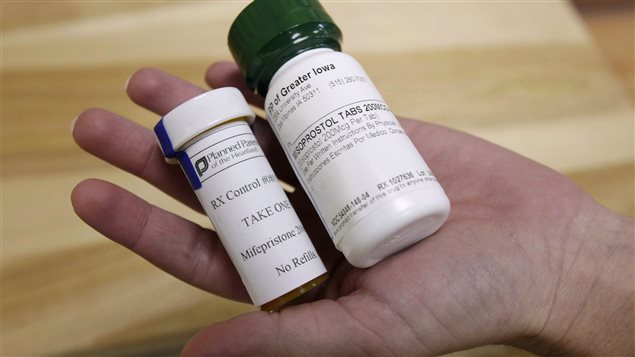Canadian doctors are sounding the alarm over a restrictive abortion pill access program that requires them not only to prescribe the drug but dispense it as well.
Last year, after one of the longest drug approval processes on record, Health Canada agreed to allow doctors to begin prescribing the home abortion pill Mifegymiso, more commonly known as RU-486, as of July 1 this year.
However, under a restricted drug access program, only registered doctors who complete a certified, online training program will be allowed to prescribe and dispense Mifegymiso. It won’t be possible for women to get the drug from a pharmacist.
Too cumbersome for doctors
These restrictions will be too difficult for family doctors in rural and remote communities who do not have experience maintaining the supply and distribution of pharmaceuticals, argue women’s rights activists.
“Most family physicians we’ve spoken to don’t have any mechanism to sell drugs to their patients,” Dr. Wendy Norman of the Society of Obstetricians and Gynaecologists of Canada told CBC News in a recent interview.
“You also need to buy, stock, store and maintain a stock — that is, recognize when something’s about to be out of date and change it over. And this is outside the expertise of physicians. We don’t have training in this, speaking as a family doctor myself.”
‘Demeaning to Canadian women’
In addition, under Health Canada rules a doctor may insist on witnessing the woman taking the first dose, Norman said in an earlier interview with Postmedia News.
It’s a practise normally reserved in cases of suspected drug diversion or misuse.
“There is no evidence in any jurisdiction that women would seek and obtain a mifepristone prescription, yet not use it,” Norman, a leading researcher in sexual and reproductive health at the University of British Columbia, told Postmedia. “This requirement is medically unnecessary and demeaning to Canadian women.”

Balancing accessibility and patient safety
Federal Health Minister Jane Philpott, herself a practising physician, said she is aware of the concerns.
“We are committed to making sure that this medication is accessible. But with any medication, particularly new ones, it is important that the prescribers have the appropriate competence, that they are well-informed as to the nature of the medication, and what it’s effectively to be used for, what concerns to watch out for,” she said in an interview with CBC News.
Philpott also said the restrictions on how the drug is distributed could change.
“They can always be adjusted along the way with appropriate evidence and reassurance that the system is functioning appropriately, she said. We have to balance accessibility with making sure patients are safe, and these medications that do have some concerns to make sure they are taken safely, and that no unnecessary harm will be done.”
The two-step drug regimen pairs two drugs. When used within 49 days of pregnancy, the combination induces an abortion similar to a natural miscarriage.
The drug is expected to be available in Canada in the fall.
With files from CBC News







For reasons beyond our control, and for an undetermined period of time, our comment section is now closed. However, our social networks remain open to your contributions.